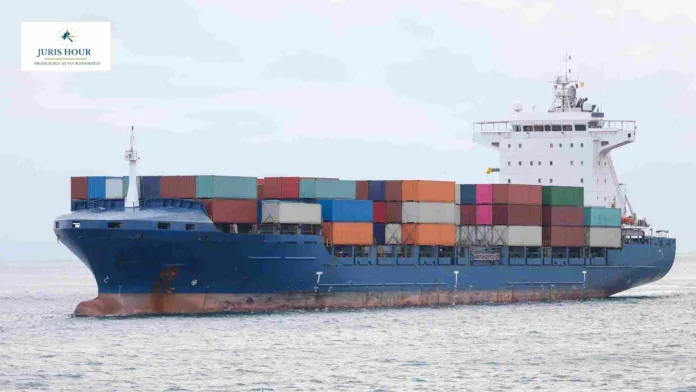In a landmark step towards modernising India’s maritime trade regulations, the Carriage of Goods by Sea Act, 2025 has been enacted, replacing the nearly 100-year-old Indian Carriage of Goods by Sea Act, 1925. The new law, which received the assent of the President on August 8, 2025, seeks to comprehensively redefine the rights, duties, liabilities, and immunities of carriers engaged in sea transport of goods, in line with contemporary global shipping standards.
Background and International Alignment
The legislation draws heavily from international maritime conventions, beginning with the 1922 and 1923 Brussels Maritime Law Conferences, which led to the creation of uniform rules for bills of lading. These were later revised through the Brussels Protocols of 1968 and 1979, known collectively as the Hague-Visby Rules.
India had earlier incorporated the original 1924 rules into domestic law via the 1925 Act, but significant changes in global trade, containerisation, and risk allocation necessitated a full legislative update. The 2025 Act incorporates the amended rules with specific modifications to suit India’s port operations, trade patterns, and regional shipping practices.
Scope of Application
The Act applies to contracts for the carriage of goods by sea in ships departing from Indian ports to any domestic or foreign destination. It explicitly requires that bills of lading — the primary legal documents governing sea cargo — must state that they are subject to the Act’s provisions.
Special provisions address unique trade routes, such as shipments between certain Indian ports and Sri Lanka, and voyages by sailing ships, ensuring the law’s flexibility for traditional and regional shipping practices.
Key Provisions and Changes
1. Carrier’s Responsibilities
Carriers are now legally bound to:
- Exercise due diligence before and at the beginning of a voyage to ensure the ship is seaworthy, adequately manned, and properly equipped.
- Maintain all cargo spaces — including refrigerated and temperature-controlled areas — in safe condition for the goods being carried.
- Properly load, stow, carry, and discharge goods with reasonable care.
2. Accuracy and Accountability in Cargo Documentation
- Bills of lading must accurately record cargo marks, quantity, and condition, as furnished by the shipper.
- Carriers are allowed to refuse to certify details they cannot verify or reasonably suspect to be inaccurate.
- Shippers are deemed to guarantee the accuracy of these details and must indemnify carriers for losses caused by inaccuracies.
3. Liability and Exemptions
The Act preserves a list of exceptions where carriers are not liable for cargo loss or damage, including:
- Acts of God, war, or public enemies.
- Perils of the sea or navigable waters.
- Fire not caused by the carrier’s own fault.
- Strikes, riots, or civil commotions.
- Latent defects in the ship not discoverable through due diligence.
However, carriers lose these protections if loss results from their negligence, deliberate misconduct, or reckless actions.
4. Limitation of Liability
- Compensation for loss or damage is capped at 666.67 Special Drawing Rights (SDR) per package or 2 SDR per kilogram of gross weight, whichever is higher.
- Higher limits apply if the shipper declares a greater cargo value before shipment.
- No limitation applies where damage is caused intentionally or recklessly by the carrier.
5. Special Treatment for Dangerous Goods
- Hazardous cargo shipped without the carrier’s informed consent can be destroyed, offloaded, or neutralised without compensation.
- If declared hazardous goods later become a danger to ship or cargo, carriers may similarly dispose of them, with only general average liability applying.
6. Bulk Cargo Documentation Exception
In bulk trades where an independent third party certifies cargo weight, the bill of lading will not be prima facie proof of weight — protecting carriers from liability for discrepancies they cannot control.
Government Powers and Transitional Provisions
The Central Government has been granted authority to:
- Amend the Schedule containing the applicable rules via notification.
- Issue directions to ensure smooth implementation.
- Resolve legal or administrative difficulties for up to two years from commencement.
The Act repeals the Indian Carriage of Goods by Sea Act, 1925 but protects rights, liabilities, and proceedings that arose under the old law. References in other laws to the repealed Act will now be construed as references to the 2025 Act, ensuring legal continuity.
Next Steps
The Ministry of Ports, Shipping, and Waterways is expected to notify the date of enforcement shortly. Industry stakeholders, including shipping companies, freight forwarders, and exporters, are being advised to review their standard contracts and operational procedures to ensure compliance.
With India handling over 90% of its trade volume by sea, the Carriage of Goods by Sea Act, 2025 is poised to play a central role in facilitating secure, efficient, and legally certain maritime transport for decades to come.
Read More: Two Techies Face Prosecution for Repeated Bogus Tax Deduction Claims

